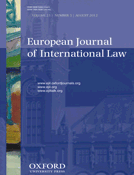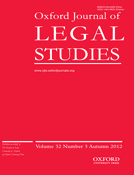
UNIVERSITY OF TORONTO LAW JOURNAL
Scope & Guideline
Navigating the Intersection of Law and Society
Introduction
Aims and Scopes
- Interdisciplinary Legal Scholarship:
The journal encourages contributions that cross traditional boundaries, integrating insights from political science, sociology, economics, and other fields to enrich legal discourse. - Focus on Canadian Law:
A significant portion of the journal's publications is dedicated to issues pertinent to Canadian law, exploring its unique challenges and developments within the broader context of international law. - Critical Perspectives on Law and Society:
The journal aims to provide a platform for critical analysis of legal doctrines and practices, particularly how they affect marginalized communities and social justice. - Emerging Themes in Law:
The journal is committed to addressing contemporary issues in law, including but not limited to human rights, environmental law, and the implications of technology on legal frameworks. - Legal Theory and Philosophy:
A strong emphasis on legal theory allows for discussions on the philosophical underpinnings of law, including debates on morality, justice, and the role of law in society.
Trending and Emerging
- Human Rights and Social Justice:
Recent articles emphasize human rights issues and social justice, reflecting an increased commitment to exploring how law intersects with equity and inclusivity. - Technology and Law:
Emerging themes related to technology, such as privacy, data governance, and the legal implications of artificial intelligence, are increasingly prevalent, indicating a response to the rapid digital transformation. - Environmental Law and Sustainability:
The journal is increasingly addressing environmental law, focusing on sustainability and the legal frameworks necessary to combat climate change and protect natural resources. - Feminist and Gender Perspectives in Law:
There is a noticeable rise in scholarship that examines legal issues through feminist and gender lenses, highlighting the complexities of gender in legal contexts and advocating for reform. - Critical Disability Studies:
Themes related to disability rights and the legal recognition of diverse abilities are gaining traction, reflecting a broader societal push towards inclusivity and recognition of marginalized voices.
Declining or Waning
- Traditional Doctrinal Analysis:
There appears to be a decline in purely doctrinal legal analysis, with fewer articles focusing solely on the interpretation of legal texts without contextual or interdisciplinary considerations. - Focus on International Treaties and Agreements:
The journal has seen a reduction in articles centered on international treaties, suggesting a shift towards more localized and contemporary issues in law that resonate with current societal challenges. - Historical Legal Analysis:
While historical perspectives are still relevant, there is a noticeable decrease in publications that focus exclusively on historical legal analysis, indicating a preference for discussions that engage with present-day implications. - Conventional Legal Education Topics:
Topics traditionally covered in legal education, such as foundational legal principles, are appearing less frequently as the journal embraces more innovative and critical approaches to legal scholarship. - Economic Analysis of Law:
There is a waning interest in the economic analysis of law, which was once a prominent theme, as the focus shifts towards broader socio-political implications of legal frameworks.
Similar Journals

De Jure Law Journal
Connecting Researchers and Practitioners in Legal Studies.De Jure Law Journal, published by Pretoria University Law Press, is a reputable open access journal that has been serving the legal community since its establishment in 2011. With its commitment to disseminating high-quality research, this journal focuses on various aspects of law and legal principles, encompassing a broad range of topics from constitutional law to international legal frameworks. The journal's ISSN 1466-3597 and E-ISSN 2225-7160 ensure that it is easily accessible and widely recognized in academic circles. Positioned as a significant contributor to legal scholarship in South Africa and beyond, De Jure Law Journal is dedicated to fostering a critical dialogue among researchers, practitioners, and students alike, making it an essential resource for anyone engaged in legal studies.

European Journal of International Law
Fostering critical dialogue in international law and politics.The European Journal of International Law (EJIL), published by Oxford University Press, stands as a leading platform for the dissemination of innovative research in the realms of International Law and Political Science. With an impressive ISSN of 0938-5428 and E-ISSN of 1464-3596, this prestigious journal has achieved Q1 rankings in both Law and Political Science and International Relations categories as of 2023, emphasizing its significance among contemporary scholarly publications. Spanning contributions from a diverse range of disciplines, the EJIL serves as an essential resource for researchers, professionals, and students alike, promoting critical dialogue on pressing international legal issues. Although currently not offered as an open-access journal, it continues to retain a high impact factor, as evidenced by its substantial Scopus rankings, placing it within the top percentiles in multiple categories. Its commitment to scholarly excellence is reflected in a convergence of research trends from 2005 to 2024, and it remains dedicated to fostering informed discourse on global legal frameworks and their implications.

FORDHAM LAW REVIEW
Fostering Innovation in Legal Theory and PracticeFORDHAM LAW REVIEW is a prestigious legal journal published by Fordham University, School of Law, based in the United States. Established to disseminate cutting-edge legal scholarship, this journal has consistently achieved an impactful standing within the field, evidenced by its category ranking as Q1 in Law for 2023 and its Scopus ranking of #428 out of 1025 in the Social Sciences Law category, placing it in the 58th percentile. The journal welcomes submissions across diverse legal topics, fostering discourse that advances both legal theory and practice. Although it does not currently offer open access options, the Fordham Law Review serves as a vital resource for scholars, practitioners, and students seeking insights into contemporary legal challenges and developments. With its rich publication history dating back to the converged years of 1973 through 2024, the journal continues to be a cornerstone for rigorous legal analysis and a platform for influencing the evolution of law.

DUKE LAW JOURNAL
Cultivating diverse perspectives in legal studies.DUKE LAW JOURNAL is a premier scholarly journal published by Duke University, dedicated to advancing the field of law through rigorous research and critical analysis. With an ISSN of 0012-7086 and an E-ISSN of 1939-9111, this distinguished journal has established itself as a vital resource for legal scholars, practitioners, and students alike. As a member of the top quartile (Q1) in Law for 2023 and ranking 267 out of 1025 in the Scopus database, the journal showcases high-impact articles that contribute to the contemporary discourse on legal theory, practice, and reform. While it does not currently offer open access, its rich archive since 1978 provides invaluable insights into significant legal developments in the United States and beyond. The DUKE LAW JOURNAL serves not only as a repository of knowledge but also as a forum for diverse perspectives, making it an essential tool for anyone engaged in the legal profession or academia.

UNIVERSITY OF NEW SOUTH WALES LAW JOURNAL
Pioneering Perspectives in Law and Related DisciplinesUniversity of New South Wales Law Journal, published by the University of New South Wales, Faculty of Law, is a leading academic journal that serves as an essential platform for discourse in the field of legal studies. With an ISSN of 0313-0096 and an E-ISSN of 1839-2881, the journal has been a beacon of legal scholarship since its inception in 1983. Operating from Kensington, New South Wales, Australia, it provides profound insights into various legal issues, emphasizing interdisciplinary perspectives by also being recognized in the fields of philosophy, sociology, and political science. While it maintains a Q3 ranking in Law and has shown increased visibility in Philosophy at Q2 according to the 2023 category quartiles, the journal assures a diverse range of critical analyses from scholars, professionals, and students alike. It is particularly valuable for researchers seeking to engage with contemporary legal debates, ensuring they remain at the forefront of academic and practical discussions in law and related disciplines.

Oxford Journal of Legal Studies
Elevating Understanding of Complex Legal FrameworksThe Oxford Journal of Legal Studies, published by Oxford University Press, stands as a prestigious platform for scholarly discourse within the field of law. Renowned for its impactful contributions to legal scholarship since its inception in 1981, this journal has established itself in the top tier of its category, currently classified as Q1 in Law based on the 2023 category quartiles. With its ISSN 0143-6503 and E-ISSN 1464-3820, the journal provides a comprehensive exploration of contemporary legal issues, theoretical perspectives, and empirical research, attracting contributions from leading academics and practitioners alike. Residing within the Social Sciences arena, it holds an impressive rank of 194/1025, landing it in the 81st percentile according to Scopus rankings. Though not currently an open-access publication, the Oxford Journal of Legal Studies remains vital for researchers, professionals, and students eager to deepen their understanding of legal frameworks and contemporary challenges within the legal landscape. Located in the heart of the United Kingdom, at Great Clarendon St, Oxford OX2 6DP, England, the journal is an indispensable resource for those advancing the study and practice of law.

German Law Journal
Fostering Dialogue Across Legal FrontiersGerman Law Journal, published by Cambridge University Press, stands as a leading open-access platform for scholarly discourse in the field of law, having made its content freely available since 2019. With an impressive impact factor that places it in the Q1 category for Law as of 2023, and a robust Scopus ranking of #164 out of 1025 in the social sciences category, this journal is recognized for its high-quality research and significant contributions to legal scholarship. The journal encompasses a wide array of topics pertinent to the German legal system, European Union law, and comparative legal studies, thus catering to researchers, legal practitioners, and students alike. Located in the heart of the UK, at Edinburgh Building, Shaftesbury Rd, Cambridge, this journal not only fosters academic engagement but also promotes interdisciplinary dialogues that enrich the understanding of legal principles in an evolving global context. Emphasizing accessibility and high academic standards, the German Law Journal serves as an essential resource for those seeking to explore and contribute to contemporary legal discussions.

Utrecht Journal of International and European Law
Elevating International and European Law DiscourseUtrecht Journal of International and European Law, published by UBIQUITY PRESS LTD, serves as a dynamic platform for the dissemination of scholarly research in the realms of international and European law. Since its inception as an open-access journal in 2013, it has provided unrestricted access to cutting-edge legal scholarship, fostering global dialogue among legal professionals, researchers, and students. With a notable Scopus rank of 249 out of 1,025 in the law category and a commendable Q3 rating, the journal emphasizes innovative legal theories and practices relevant to contemporary global challenges. Located in the heart of the United Kingdom, the Utrecht Journal is committed to maintaining high academic standards while also promoting the exchange of knowledge across borders, which is crucial given the ever-evolving landscape of international law. As it converges its focus from 2020 to 2024, the journal seeks to become an essential reference for those dedicated to the exploration and expansion of legal discourse in this vital field.

OSGOODE HALL LAW JOURNAL
Fostering Dialogue, Shaping Legal FuturesOsgoode Hall Law Journal, published by the renowned York University Osgoode Hall Law School, serves as a vital platform for legal scholarship in Canada. With a commitment to advancing knowledge in various fields of law, this journal publishes a broad range of articles, case studies, and critical analyses that address contemporary legal issues. While specific impact factors and indexing metrics such as H-Index and Scopus Ranks are not available, the journal's long-standing reputation and contributions to legal education make it an essential resource for researchers, legal practitioners, and students alike. Although it does not offer Open Access options, readers can access its content through libraries and subscriptions, ensuring the dissemination of high-quality legal research. The journal's aim is to foster robust dialogue among legal scholars and practitioners, thereby shaping the future of legal discourse in Canada and beyond.

University of Bologna Law Review
Connecting Scholars and Practitioners in Legal ResearchUniversity of Bologna Law Review, published by UNIV STUDI BOLOGNA, ALMADL JOURNALS, serves as a pivotal platform for legal scholars and practitioners in the field of law. Established as an Open Access journal in 2016, it has committed itself to disseminating high-quality research and fostering vibrant discussions around contemporary legal issues. Based in Italy, the journal addresses a broad spectrum of topics within the realm of law, enhancing its reach and applicability. Although it currently holds a Q4 ranking in the 2023 law category according to Scopus, this reflects its potential for growth and contribution to academic discourse. The journal’s h-index and precise scope will be developed as it continues to publish groundbreaking research up to 2024. With an aim to cultivate educational resources and foster innovative legal thought, the University of Bologna Law Review is an essential resource for researchers, professionals, and students alike, harnessing the power of open access to engage a global audience.